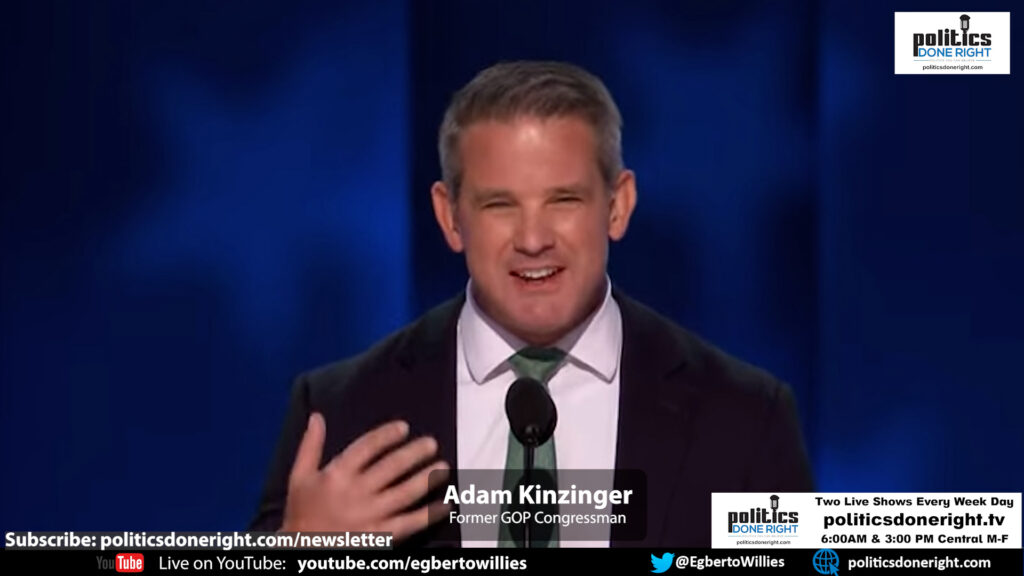Former GOP Congressman Adam Kinzinger did not hold back as he slammed his party’s MAGA conversion as he urged Republicans to vote for VP Kamala Harris.
Adam Kinzinger excoriates his party.
Podcasts (Video — Audio)
The 2024 election cycle has unveiled some of the most remarkable political shifts in recent American history, including the emergence of prominent Republicans who have taken an unequivocal stand against their party’s continued embrace of Donald Trump. In a fiery speech at the Democratic National Convention (DNC) in Chicago, former GOP Congressman Adam Kinzinger delivered a scathing indictment of the Republican Party and its allegiance to a figure he considers antithetical to the principles upon which the party was once built. This moment marks a significant departure for Kinzinger and the broader political landscape, as former party lines blur in the face of what many see as an existential threat to American democracy.
Kinzinger’s speech at the DNC was nothing short of a political earthquake. As he stood before a crowd that included both long-time Democrats and disillusioned Republicans, Kinzinger did not mince words. His speech was a blistering takedown of Donald Trump, whom he described as a “weak man pretending to be strong” and a “faithless man pretending to be righteous.” However, Kinzinger’s critique went beyond just Trump; he lambasted the Republican Party itself for abandoning its core values and succumbing to what he called a “fundamental weakness” that has “coursed through my party like an illness.”
For Kinzinger, the stakes of this election are not merely about policy differences or partisan loyalty; they are about the nation’s very soul. He recalled his youthful attraction to the Republican Party of Ronald Reagan, a party that once stood for a “strong America” and the ideals of a “Shining City on a Hill.” However, the party he joined has transformed into something unrecognizable. “The Republican Party is no longer conservative,” Kinzinger declared, accusing it of having “switched its allegiance from the principles that gave it purpose to a man whose only purpose is himself.”
While Kinzinger maintains the false belief that Ronald Reagan’s policies were a net positive, it is essential to counter that. Reagan was instrumental in creating Trump. We will cover that in another article.
This speech is particularly significant because Kinzinger is not just another political figure; he is a former Congressman who sat on the January 6th Committee, where he witnessed firsthand the depths of Trump’s efforts to subvert the 2020 election. His experience during the insurrection and subsequent decision to break with his party has made him a symbol of the moral and ethical struggle within the GOP. His decision to speak at the DNC and endorse Kamala Harris for president is a stark reminder that the traditional political alliances in America are shifting in once unimaginable ways.
Kinzinger’s endorsement of Kamala Harris also speaks volumes. He acknowledged that while he may disagree with her on certain policies, those disagreements “pale in comparison” to the fundamental issues of “principle, decency, and fidelity to this nation.” In doing so, Kinzinger is making a powerful appeal to Republicans who still hold to the ideals of democracy, urging them to “put country first” and vote for a candidate committed to upholding the Constitution and the rule of law.
Kinzinger’s speech is also a clarion call to action for Americans across the political spectrum. He challenges his fellow Republicans to ask themselves how they can continue to support a party that has “tarnished the gifts that our forbearers fought for,” especially when the alternative is a candidate who stands for the same democratic values they once held dear. His message is clear: this election is not about left versus right; it is about democracy versus autocracy, truth versus lies, and patriotism versus blind allegiance to a demagogue.
This speech resonated deeply with many Americans disillusioned with the current state of the Republican Party. It also reflects a broader trend of prominent Republicans either leaving the party or openly opposing its direction under Trump. These voices, including those of figures like Liz Cheney and Mitt Romney, represent a significant ideological divide within the GOP that could have lasting implications for the future of American politics.
Ultimately, Kinzinger’s speech at the DNC is more than just a moment of political theater; it is a profound statement about the nation’s state and the choices ahead. As Kinzinger himself put it, “Democracy knows no party,” and in this moment of crisis, Americans must unite to defend the values that define the nation. His words are a powerful reminder that the battle for the soul of America is not yet over and that every citizen has a role to play in ensuring that the country remains a beacon of hope and freedom in an increasingly uncertain world.
The 2024 election may be remembered as a turning point, not just for the outcome of a single race but for the future of American democracy itself. Kinzinger’s speech will undoubtedly go down in history as a defining moment in that struggle.

